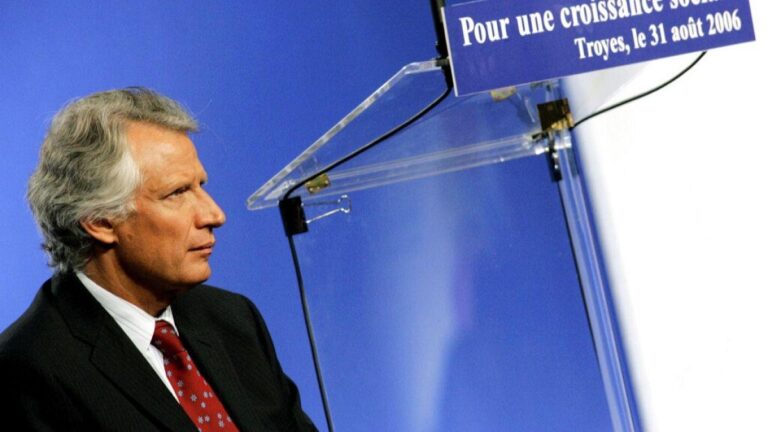In a significant political development in France, former Prime Minister Dominique de Villepin has announced the launch of a new political party, reviving his influence in the country’s political landscape. Known internationally for his poignant speech before the United Nations in 2003, where he vehemently opposed the Iraq war, de Villepin aims to reinvigorate French politics and offer a fresh alternative to the established parties. As the nation grapples with pressing issues such as economic instability and social unrest, de Villepin’s move comes at a critical juncture, challenging traditional political norms and signaling a potential shift in the electorate’s sentiments. This article examines de Villepin’s motivations, his vision for France, and the implications of his comeback in shaping the future of French political discourse.
Former French Prime Minister de Villepin Forges New Political Path with Party Launch
In a bold move that signals his return to the political arena, former Prime Minister Dominique de Villepin has officially launched a new political party, aiming to address what he perceives as the pressing challenges facing France in the contemporary era. Known internationally for his impassioned 2003 speech against the Iraq war, de Villepin now seeks to reestablish his influence by focusing on key issues such as social inequality, environmental sustainability, and national sovereignty. He describes his political vision as one that embraces unity and dialogue amidst the growing divide in French society.
De Villepin’s party seeks to attract a diverse following by prioritizing core principles that resonate with many citizens. Key aspects of his platform include:
- Strengthening social cohesion through comprehensive reforms in education and healthcare
- Promoting environmental responsibility by advancing green policies and investments
- Enhancing national security while preserving individual liberties
This new political venture comes at a crucial time as France grapples with economic challenges and social unrest. With a team of seasoned advisors and a commitment to grassroots engagement, de Villepin aims to rekindle the spirit of public service and inspire a new generation of voters.
Revisiting the Legacy of de VillepinŌĆÖs Iconic Anti-War Speech in Context of Current Politics
Dominique de Villepin’s powerful rhetoric during his 2003 speech opposing the Iraq War remains a defining moment in contemporary political discourse. As he stood in front of the United Nations, passionately arguing against military intervention, his words resonated not just within France but across the globe. His emphasis on diplomacy over warfare and the need for a multilateral approach prompted many to reconsider the consequences of unilateral actions in international politics. Now, as de Villepin embarks on a new political venture by launching a party, his history serves as a pivotal reference point for those debating foreign policy in today’s increasingly polarized environment.
In current political landscapes, where the echoes of past conflicts still shape ideologies, de VillepinŌĆÖs stance provides a vital framework for understanding the relationship between governance and international relations. The resurgence of nationalism and unilateralism poses a challenge to diplomatic norms, which de Villepin championed. As voters look for leadership that prioritizes peaceful solutions and collaboration, his legacy may inspire a new generation of politicians and citizens advocating for a return to fundamental diplomatic principles. This intersection of past warnings and present realities invites a reevaluation of how societies choose to engage with global crises.
Strategic Goals and Vision for de Villepin’s New Political Party Amidst France’s Political Shifts
As France navigates a tumultuous political landscape, de Villepin’s newly launched party aims to redefine the national discourse. His strategic goals emphasize a commitment to a robust democratic process, revitalizing public trust in government institutions, and fostering a platform that resonates with the diverse needs of the French populace. Key objectives include:
- Strengthening National Unity: Promoting policies that bridge socio-economic divides.
- Environmental Leadership: Advocating for sustainable initiatives to combat climate change.
- Economic Innovation: Supporting entrepreneurship and job creation through forward-thinking regulation.
- Global Diplomacy: Enhancing France’s role on the international stage through collaborative efforts.
The envisioned party stands against populism and disillusionment, striving for an inclusive dialogue across the political spectrum. A distinct vision underscores the importance of civic engagement and grassroots mobilization, aiming to empower citizens in redefining the political narrative. To achieve this, de Villepin’s team is implementing:
| Initiative | Description | Expected Outcome |
|---|---|---|
| Community Forums | Local gatherings for citizen input | Enhanced public participation |
| Youth Engagement Programs | Workshops to involve the younger generation | Increased political awareness |
| Transparency Campaign | Measures to promote governmental accountability | Restoring trust in political institutions |
Public Response and Implications for the Future of French Political Landscape
The public’s reaction to Dominique de Villepin’s announcement of a new political party has been a mix of intrigue and skepticism. Many see his return as a potential game-changer in a landscape often dominated by entrenched political figures. Key points raised by analysts include:
- De Villepin’s charismatic leadership style, reminiscent of his days as Prime Minister.
- The discontent among voters regarding the current administration, creating a ripe environment for new voices.
- Potential alliances with other disillusioned political factions, who may see de Villepin as a unifying figure.
Looking ahead, the implications of his new party could significantly alter voter dynamics in France. As elections loom, de Villepin’s platform will be scrutinized, especially concerning national unity and foreign policy. A recent poll indicated:
| Public Sentiment | Percentage |
|---|---|
| Support for new political directions | 65% |
| Uncertainty about leadership effectiveness | 55% |
| Desire for change in foreign policy | 72% |
These figures highlight the potential for de Villepin to tap into a broader sentiment for change and rejuvenate a political atmosphere that many consider stagnant. How effectively he can mobilize these feelings into a cohesive political force remains to be seen.
The Way Forward
In conclusion, Dominique de Villepin’s return to the political arena marks a noteworthy development in France’s evolving political landscape. His new party aims to harness the energy of those disillusioned with the current political establishment, echoing the passionate oratory that defined his stance against the Iraq war in 2003. As he rallies support for his vision, it remains to be seen how his leadership will resonate with the electorate and whether he can successfully navigate the complex dynamics of contemporary French politics. As France approaches the next electoral cycle, de Villepin’s ambitions could signal a significant shift in the country’s political narrative.




